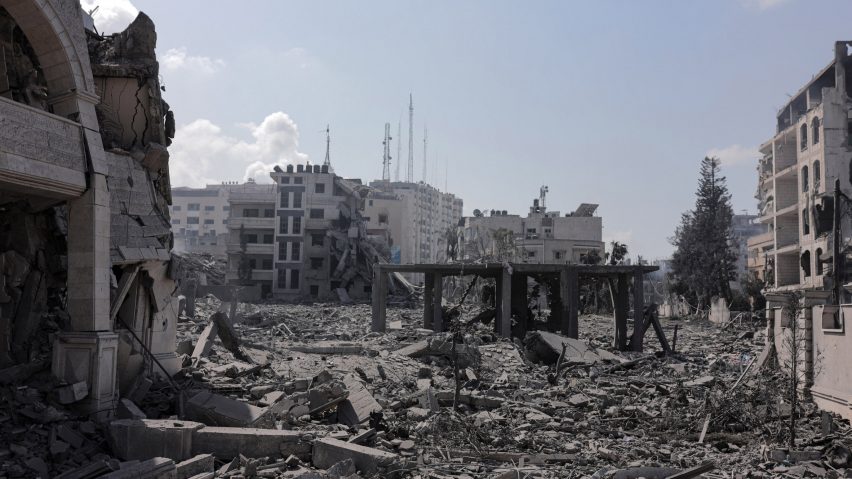
Research reveals carbon cost of Israel-Gaza war
Researchers have estimated that rebuilding the damage caused in the first four months of the Israel-Gaza war will generate up to 60 million tonnes of CO2 equivalent.
A paper titled A Multitemporal Snapshot of Greenhouse Gas Emissions from the Israel-Gaza Conflict was created by researchers at Lancaster University, Queen Mary University of London, University of Energy and Natural Resources in Ghana, charity organisation Conflict and Environment Observatory and think tank Climate and Community Project to estimate the carbon impact of the war.
The researchers calculated that rebuilding the damage caused by Israeli forces in the first 120 days of the war would generate carbon emissions of around 60 million tonnes of CO2 equivalent (CO2e) – this is similar to the annual emissions of Sweden.
"Rebuilding Gaza will entail a total emissions figure higher than the annual emissions of over 135 countries, putting on them par with that of Sweden and Portugal," the research stated.
Up to 200,000 buildings destroyed in first 120 days
There is widespread international condemnation of Israel's latest war in Gaza, which it launched after Hamas militants killed 1,200 people and took 250 hostages in an attack on Israel on 7 October 2023. At least 36,000 Palestinians, including 15,000 children, have been killed by Israeli forces in the eight months since.
The United Nations' (UN) top court, the International Court of Justice (ICJ) is currently hearing a case brought by South Africa that alleges that Israel's assault amounts to genocide, while a UN human rights expert recently stated that there are "reasonable grounds" to believe that Israel is committing genocide against Palestinians.
According to the paper, between 156,000 and 200,000 buildings in Gaza were destroyed in the first 120 days of the war.
Based on the amount of steel and concrete needed for construction and repair, as well as the transportation of materials into Gaza, the researchers estimated that rebuilding would generate between 46.8 million and 60 million tonnes of carbon dioxide equivalent (CO2e).
"Building storey height, construction type and floorplan area vary, and a review has not been undertaken for this estimate," the paper said.
"However, taking a conservative estimate, we assume that each of the buildings needing to be rebuilt or restored has embodied emissions of 300 tonnes of CO2," it continued. "This estimate is based on the amount of steel and concrete to be used in reconstructing these buildings as well as their transportation to Gaza."
The team also estimated the immediate carbon impact of the first 120 days of the Israel-Gaza war. Including tailpipe emissions and the manufacturing of bombs and munitions, the researchers estimated that the emissions were in the range of 420,265 to 652,552 tonnes of CO2e.
Additionally, the research analysed the carbon cost of war infrastructure and fortification constructed by Israel and Hamas in the 16 years prior to the 7 October assault, including the Hamas tunnel network and Israel's Iron Wall.
It stated that the tunnels and Iron Wall are carbon-intensive, largely due to the amount of concrete used, and that the two structures have a combined emission estimate of up to 791,187 tonnes of CO2e.
The paper acknowledged that not all carbon emissions related to the war were covered and that there were gaps in the data available, saying that analysis of a wider scope is needed.
"Understanding and mitigating the environmental impact of warfare is crucial"
Written by Frederick Otu-Larbi, Benjamin Neimark, Patrick Bigger, Linsey Cottrell and Reuben Larbi, the team hopes the paper will encourage further studies and policy changes addressing the climate impact of wars.
"The study highlights the need for comprehensive reporting of military emissions to the UNFCCC and an increased awareness of the climate impact of conflicts," said Queen Mary University of London lecturer Neimark.
"As the world grapples with the dual crises of climate change and military conflicts, understanding and mitigating the environmental impact of warfare is crucial."
"The carbon emissions associated with Israel's invasion of Gaza are not the most important reason that the global community should be pushing for a ceasefire – every single life still at risk is important, but this research demonstrates some of the long run social and environmental impacts of war, serving as a reminder that armed conflict brings us closer to the precipice of catastrophic warming," added Bigger, research director at the Climate and Community Project.
The photo is courtesy of Shutterstock.
Comments have been turned off on this story due to the sensitive nature of the subject matter.